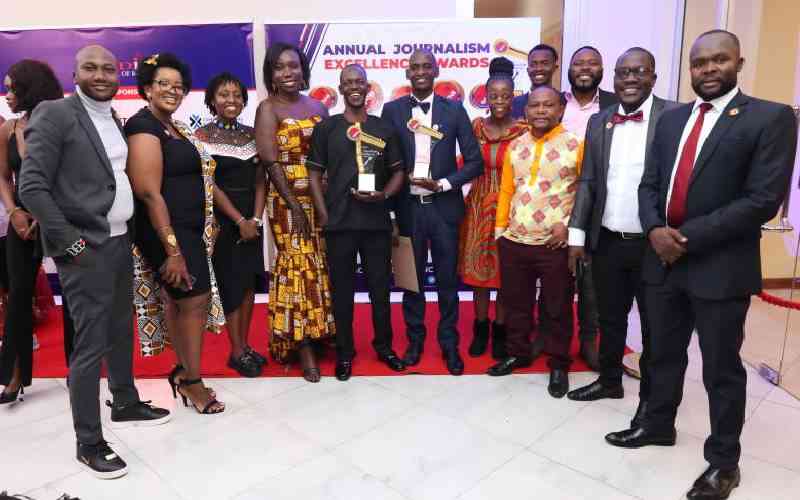
The Standard Group journalists were among the scribes feted on Friday during the Annual Journalism Excellence Awards (AJEA).
The 2024 Awards Gala celebrated excellence, innovation, and dedication in Kenya's media industry, reaffirming its role in shaping public discourse and driving positive societal change.
The event which was hosted by the Media Council of Kenya (MCK) at the Edge Convention Centre in Nairobi saw journalists walk away with awards under various platforms, including print, television, radio and digital.
Among the standout winners were journalists from The Standard Group, who clinched two coveted awards, showcasing their prowess in print and podcasting.
Isaiah Gwengi's investigation into the detrimental impact of cage culture on Nyanza's landing sites earned him the Best Print Story accolade.
Steve Ondieki's podcast, "The Blue Gold Rush: Race to Control Kenya's Shrinking Water Towers," won the Podcast of the Year title.
The Journalist of the Year award went to Elizabeth Ochieng for her compelling narrative, "A Sweatless Survival," delving into health and science issues.
The Standard Group made a notable impression with 14 entries out of the 1,081 submissions received this year, affirming its commitment to journalistic excellence.
Other outstanding entries included Wellington Nyongesa's coverage of environmental challenges that showcased the breadth of impactful journalism with his story on "Conservationist and Investors' Big Battle for the Gem of Laikipia plains."
Gardy Chacha's presentation on technological innovations impacting healthcare was also recognized at the event.
Hezron Kimari explored innovative farming practices while Gardy Chacha presented his coverage of agricultural transformations with his story "Portable Scan Saving Lives of Mothers, Babies."
Winfrey Owino and Denish Ochieng pitched the investigative pieces shedding light on societal issues, while Rebecca Muiruri and John Muthoni presented in development and public affairs reporting.
Additionally, Elizabeth Matosio, Nicholas Kibet Biwott, and Brenda Dzeda Radido received recognition for their governance reporting on "Broke Millionaires".
Agutu Rosa, presented the "1998 Blast Through the Eyes of Mothers and the Babies", while under Health and medical reporting, Francis Odee presented "Jinamizi la afya."
The best TV production award went to Maurice Owino, with "Kinywaji cha Mauti" while Videographer of the Year went to Hebron Kinyoda, who presented "Uhifadhi wa mazingira."
MCK also acknowledged the lifetime achievements of esteemed journalists including Elizabeth Obege, Ali Salim M'Manga, Peter Mwaura, and Prof Wambui Kiai.
Their contributions spanning over two decades have significantly enriched Kenya's media landscape.
Noteworthy observations from the event included a surge in entries for environmental reporting, reflecting heightened awareness of ecological issues.
The Environment and Climate Change Reporting category recorded the highest entries at 178, up from 44 entries last year.
“This surge reflects the growing interest in environmental issues in media coverage, highlighting the media's pivotal role in raising awareness and stimulating conversations on critical societal issues,” Rachel Ombaka chairperson of AJEA judges panel said.
There was commendable improvement in the quality of stories submitted by vernacular TV stations, with one entry standing out for its captivating translation and captions, making it accessible to a wider audience.
The Gender Reporting category experienced a decline in submissions compared to the previous year, emphasizing the continued importance of gender-related journalism despite the decrease in entries.
However, challenges such as misclassification of entries and verification of original publications underscored the need for continued refinement in the award process.
Attorney General Justin Muturi scoffed at those opposed to media freedom, saying his office will support the industry to do their work without interference.
“We cannot wish away the media, no matter how much we disagree or agree. That is normal. Without free media there cannot be any democracy. The passion of the masses is logical to make logical decisions as to leadership. This can only be conveyed through the media," Muturi said.
“As guardians of democracy, and purveyors of information, the media plays a critical role in shaping public opinion, influencing policy and holding those in power accountable,” he said.
However, Muturi urged media houses to observe ethical values in their reporting to avoid misreporting.
“Journalists are guardians of truth and credibility depending on adherence to ethical standards. The profession has set off code of conduct principles and standards which they are expected to uphold in their workplace,” he said.
“This code ensures fairness, impartiality and accuracy in reporting required for journalists to verify information for balanced coverage. The people you serve expect the very best of you,” he added.
MCK Chief Executive Officer David Omwoyo reiterated the council's dedication to upholding journalistic standards and fostering partnerships to strengthen the awards' credibility.
“We remain committed to build further on the credibility of these awards, including on the various partnerships towards the awards. I am pleased with the partners we have brought on board throughout,” Omwoyo said.
Dagoretti South MP John Kiarie urged journalists to embrace the digital world to survive the changing times.
“The sustainability of the media industry at a time of crisis and going into the future is innovation. Journalism can see innovation and match into the new world as a tool, as a facilitator and enabler of journalism in this age,” Kiarie said.
However, he noted that despite the challenges, the media industry cannot be replaced.
“Journalists will be here in good times, in times of crisis, calamity because even in history at any time, the world had a calamity to be reported, journalists were there,” he said.
“Journalists have a bigger mandate through data collection, collate and processor."
“Every generation must, out of relative obscurity, discover its mission and decide whether to fulfil it or to forfeit it.”